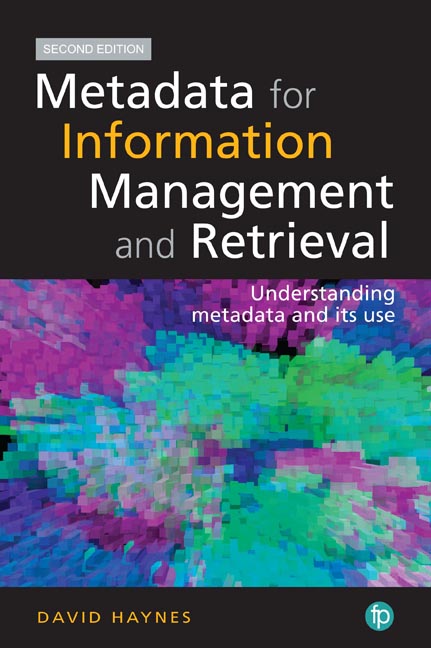Book contents
- Frontmatter
- Contents
- List of figures and tables
- Preface
- Acknowledgements
- PART I METADATA CONCEPTS
- PART II PURPOSES OF METADATA
- 5 Resource identification and description (Purpose 1)
- 6 Retrieving information (Purpose 2)
- 7 Managing information resources (Purpose 3)
- 8 Managing intellectual property rights (Purpose 4)
- 9 Supporting e-commerce and e-government (Purpose 5)
- 10 Information governance (Purpose 6)
- PART III MANAGING METADATA
- References
- Index
9 - Supporting e-commerce and e-government (Purpose 5)
from PART II - PURPOSES OF METADATA
Published online by Cambridge University Press: 08 June 2018
- Frontmatter
- Contents
- List of figures and tables
- Preface
- Acknowledgements
- PART I METADATA CONCEPTS
- PART II PURPOSES OF METADATA
- 5 Resource identification and description (Purpose 1)
- 6 Retrieving information (Purpose 2)
- 7 Managing information resources (Purpose 3)
- 8 Managing intellectual property rights (Purpose 4)
- 9 Supporting e-commerce and e-government (Purpose 5)
- 10 Information governance (Purpose 6)
- PART III MANAGING METADATA
- References
- Index
Summary
Overview
This chapter considers the ways in which metadata is used for e-commerce and egovernment. It describes use of metadata for marketing and online behavioural advertising. E-commerce is illustrated with an example from the book trade, ONIX, and with a description of music industry metadata and digital images. It finally looks at egovernment, focusing on the documentary aspects of transactions and the role that metadata plays in facilitating these transactions.
Electronic transactions
E-commerce and e-government are two sides of the same coin. They are about human interaction with organisations via the internet that result in transactions of one kind or another. In the case of e-commerce that interaction is with commercial organisations. In e-government the interaction is with public bodies. E-government has a slightly wider definition, in that public education and information can also be considered a part of e-government even if it is not a part of a specific transaction.
The main difference between the two is that transactions with individuals may involve metadata behind the scenes, but do not require overt handling of metadata by the consumer. For instance if an individual is recording a life event via the internet (such as registering a death), the ‘Tell Us Once’ service in the UK effectively allows surviving relatives to complete one death registration form and the data on that form is used to inform the local authority, the tax authorities, benefits agencies, vehicle licensing, passport office and national savings accounts.
Many e-commerce and e-government systems depend on tagging (metadata) to make their sites discoverable by target groups and the use of metadata in this way is explored in Chapter 6 on retrieving information. Ecommerce and e-government systems also deal with personal data and data about website interactions using technologies such as cookies to track usage of a site. This raises privacy issues which are discussed in Chapter 14. This chapter includes a discussion about metadata for cookies in the context of online behavioural advertising, a major focus for e-commerce activity.
Information
- Type
- Chapter
- Information
- Metadata for Information Management and RetrievalUnderstanding metadata and its use, pp. 139 - 150Publisher: FacetPrint publication year: 2018
